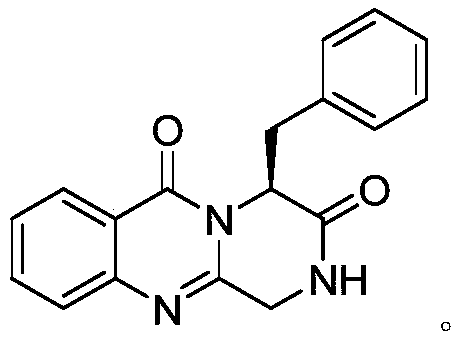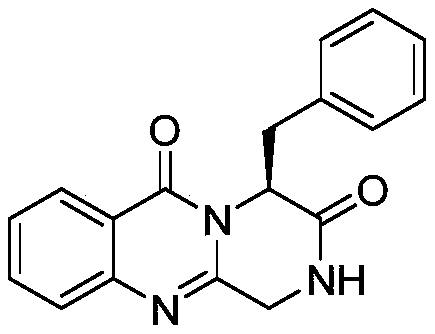Application of Quinazolinone Alkaloid Compound Derived from Marine Fungi in Control of Marine Fouling Organisms
A technology of quinazolinone and marine fungus, applied in the field of application of quinazolinone alkaloid compounds in marine fouling biological control, achieving good application prospects, great potential for promotion and application, and good social benefits
- Summary
- Abstract
- Description
- Claims
- Application Information
AI Technical Summary
Problems solved by technology
Method used
Image
Examples
Embodiment 1
[0028] The quinazolinone alkaloid compound of the present invention can be isolated from the cell of the marine fungus Aspergillus sp. SK-28. The marine fungus was isolated from the leaves of the mangrove plant Candela in the Shankou Mangrove Reserve of Guangxi Zhuang Autonomous Region; the specific steps are as follows:
[0029] 1. Seed culture:
[0030] 1.1 Preparation of seed medium: 200g of potatoes, 20g of glucose, 1L of tap water, equally distributed in five 500mL Erlenmeyer flasks, and extinguished at 121°C for 30 minutes.
[0031] 1.2 Cultivation of seeds: Inoculate the strains of marine fungi into the seed medium, place them on a shaker at a speed of 200 rpm at a temperature of 28° C., and cultivate them for 72 hours to obtain a seed culture solution.
[0032] 2. Fermentation culture:
[0033] 2.1 Prepare fermentation medium: 6000g rice, 180g sea salt, 6L tap water, extinguish at 121°C for 30 minutes.
[0034] 2.2 Fermentation culture: Aseptically transfer 5 mL of ...
Embodiment 2
[0038] Anti-biofouling activity experiment is carried out to the quinazolinone alkaloid compound in embodiment 1:
[0039] In the experimental group, the quinazolinone alkaloid compound was dissolved in methanol to prepare a solution with a concentration of 282.6 μg / mL. Add 1 mL of this solution to a petri dish with a diameter of 6 cm, and make it evenly cover the bottom of the petri dish. After the solvent is completely evaporated, the content of the quinazolinone alkaloid compound coated on the bottom of the petri dish is 10 μg / cm 2 .
[0040]Add 1mL of methanol to the control group, so that the solution is evenly distributed on the bottom of the petri dish, and then add 10mL of seawater after the solvent is completely evaporated.
[0041] Only 10 mL of seawater was added to the blank group.
[0042] Three parallel samples were set up for each of the experimental group, the control group and the blank group. Add 30 netted barnacle Venus larvae to each sample. Place them...
PUM
 Login to View More
Login to View More Abstract
Description
Claims
Application Information
 Login to View More
Login to View More - R&D
- Intellectual Property
- Life Sciences
- Materials
- Tech Scout
- Unparalleled Data Quality
- Higher Quality Content
- 60% Fewer Hallucinations
Browse by: Latest US Patents, China's latest patents, Technical Efficacy Thesaurus, Application Domain, Technology Topic, Popular Technical Reports.
© 2025 PatSnap. All rights reserved.Legal|Privacy policy|Modern Slavery Act Transparency Statement|Sitemap|About US| Contact US: help@patsnap.com


